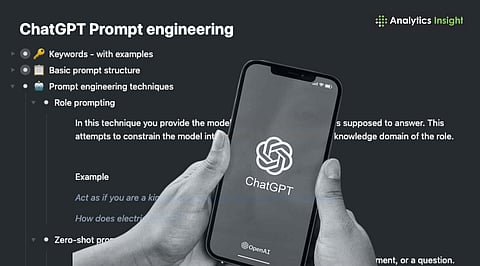

Well-structured prompts lead to more accurate and context-aware AI responses.
Adding tone, role, and context can make ChatGPT output more human and relevant.
Continuous testing and refining prompts is the key to mastering AI communication.
ChatGPT is a powerful AI, but it is not infallible. Occasionally, its answers may appear confusing, off-topic, or overly mechanical. In many cases, the issue arises from how the question is phrased.
How you frame your question directly influences ChatGPT’s response. If a prompt is unclear or lacks sufficient detail, the answer may not meet expectations. Fortunately, this can be easily corrected. This article shares five simple tips to help you write better prompts and get more natural, human-like responses from ChatGPT.
Also Read: How to Create an Interesting Quiz or Game Using ChatGPT: Step-by-Step Guide
Before you start typing, figure out what you want ChatGPT to do. Do you need an explanation? Are you trying to come up with ideas, write a blog post, or solve a problem?
If you ask a vague question such as, “Tell me about AI,” you are likely to receive a generic response. Instead, be specific, for example, ask how AI is applied in digital marketing and provide real-life examples.
When you are clear and specific, ChatGPT can better understand your requirements and provide a more accurate and helpful response. The more precise your instructions, the higher the quality of the answer will be.
ChatGPT works best when you provide it with some context or ask it to act as a specific person. This keeps it focused and clear. Instead of just saying, "Write about marketing," try this: Imagine you're a marketing guru and talk about social media trends in 2025.
This guides the AI on what to do and how to respond. Providing context also helps prevent repetitive or generic answers.
Sometimes, the easiest way to guide ChatGPT is to show it what kind of response you want. If you need a specific format or tone, just be specific.
Here are five simple ways to save some cash:
Track your spending.
Make a budget.
Cut back on eating out.
Look for deals and discounts.
Automate your savings.
Knowing where your money goes is the first step. Take a look at where you spend every month.
Once you know where your money is going, make a plan. Decide how much you can spend.
Find small ways to cut costs. Little things can add up, like making coffee at home or canceling subscriptions you don't use.
For example, instead of asking:
Give me a quick intro to digital marketing.
Tell me how SEO helps with it.
Write a summary of the main idea.
Ask each question separately.
No prompt is perfect right away. If you want to get better at using ChatGPT, just play around with it! Ask the same thing, but say it a different way and see what you get.
What are the key advantages of remote work arrangements?
From the perspective of both employees and employers, what are five specific benefits of remote work?
How does remote work aid work-life balance and boost productivity?
Each time, the answer may vary. Minor tweaks can make a big difference. With experience, you develop a sense of how ChatGPT understands instructions.
ChatGPT can get confused if you give it too much content. Try to find the right amount of information so it works well and doesn't freeze.
If the answer you get back is a mess, dial back your instructions and only focus on one thing.
Getting good at writing ChatGPT prompts just takes practice. Clear, well-structured prompts that provide enough context will yield better, more valuable results.
If you know what you want, give the AI some background, show it examples, split up big jobs, and practice, you can obtain significantly better responses. This approach not only saves time but also makes the AI appear more helpful and human-like.
1. What is a ChatGPT prompt?
A ChatGPT prompt is the text input or instruction given to the AI to generate a response.
2. Why are my ChatGPT responses inaccurate?
Inaccurate responses usually happen due to unclear or incomplete prompts lacking context.
3. How can I make my ChatGPT prompts better?
Add clear goals, context, and examples while keeping the instructions short and structured.
4. Should I use long prompts or short ones?
Balanced prompts with enough context work best - too short or too long can reduce clarity.
5. How can I test if my prompt works well?
Rephrase and experiment with multiple versions of the same prompt to compare the outputs.
